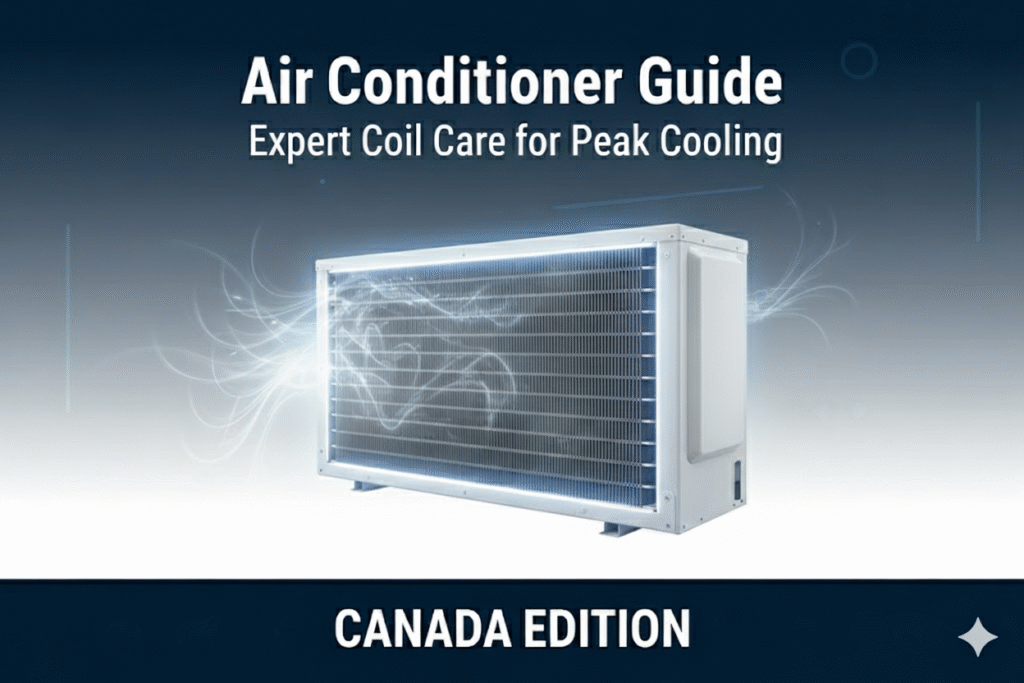Air conditioners are indispensable for Canadian households and businesses, especially during humid summers. But behind every efficient cooling system lies a critical component that often goes unnoticed: the air conditioner coils.
If you’ve ever wondered What Are the Types of Air Conditioner Coils & How To Clean AC Coils, you’re in the right place. This guide will cover everything you need to know about coil types, why they matter, how to maintain them, and when to call in professionals like GM HEATING AND COOLING INC.
Importance of Regular Coil Maintenance
Regular Air Conditioner Coil Types & Cleaning not only improves airflow but also prevents unnecessary strain on your HVAC system. When dirt, dust, and debris accumulate on the coils, your AC has to work harder to deliver cool air. This increases energy bills and reduces system lifespan. Homeowners who stay proactive with coil care often notice fewer breakdowns and more consistent cooling during hot Canadian summers.
Professional vs. DIY Coil Cleaning
While many homeowners attempt basic Air Conditioner Coil Types & Cleaning on their own, professional cleaning is often the smarter choice. Experts have the right tools, eco-friendly solutions, and the experience to clean delicate evaporator and condenser coils without damaging them. If your coils are heavily clogged, scheduling professional HVAC service ensures your system runs at peak efficiency.
Seasonal Coil Care in Canada
In Canada’s climate, seasonal maintenance is essential. Dust, pollen, and outdoor debris collect quickly on coils during spring and summer, while fall and winter bring their own challenges. Incorporating Air Conditioner Coil Types & Cleaning into your seasonal HVAC checklist ensures year-round comfort and efficiency, no matter the weather outside.
Why Knowing What Are the Types of Air Conditioner Coils & How To Clean AC Coils Matters
Coils are at the heart of the cooling process. They handle heat absorption indoors and heat release outdoors. When coils become dirty, the system works harder, leading to:
- Higher utility bills
- Shorter equipment lifespan
- Increased risk of breakdowns
- Poor indoor air quality
For Canadians dealing with fluctuating energy prices, clean and well-maintained coils can make a significant financial and comfort difference.
What Are the Types of Air Conditioner Coils & How To Clean AC Coils: The Basics
To truly understand air conditioner coil care, let’s first explore the two main coil types.
1. Evaporator Coils
Located in the indoor unit, evaporator coils absorb heat and humidity from your home’s air. The refrigerant inside evaporates, cooling the air before circulating it back indoors.
- Design: Often shaped like an “A” to maximize heat exchange.
- Materials:
- Copper — excellent heat transfer, durable, but more expensive.
- Aluminum — affordable, lightweight, corrosion-resistant, but slightly less efficient.
Canadian Context: Humidity in provinces like Ontario and British Columbia accelerates dirt and mould buildup, making evaporator coil cleaning vital.
2. Condenser Coils
Found in the outdoor unit, condenser coils release absorbed heat back into the environment. A fan blows air across the coils to disperse heat efficiently.
- Exposure Risks: Dirt, leaves, pollen, grass clippings, and winter debris.
- Canadian Factor: Snow and ice accumulation during winter can block airflow and cause damage.
Why Cleaning AC Coils Is Critical
If you’re asking What Are the Types of Air Conditioner Coils & How To Clean AC Coils, the “why” is just as important as the “how.”
- Boost Energy Efficiency: Dirty coils make your system consume 15–20% more energy.
- Lower Bills: Clean coils reduce monthly utility costs.
- Extend Lifespan: Reduces wear and tear on the compressor.
- Better Air Quality: Prevents mould and dust from circulating indoors.
How To Clean AC Coils
Safety First
- Always turn off power at the breaker.
- Wear gloves and safety glasses to protect yourself.
Cleaning Evaporator Coils (Indoor Unit)
- Access the Coils: Remove the indoor unit’s access panel.
- Dry Brushing: Use a soft-bristle brush to gently clear dust.
- Apply Coil Cleaner: Use foaming cleaner designed for evaporator coils.
- Rinse (If Needed): For rinse-required cleaners, use low-pressure water.
- Reassemble & Test: Allow coils to dry, close panel, and restore power.
Canadian Tip: Clean evaporator coils in spring before heavy AC use.
Cleaning Condenser Coils (Outdoor Unit)
- Clear Surroundings: Remove debris and ensure 2 feet of clearance around the unit.
- Brush or Vacuum: Gently clean loose dirt off coils.
- Apply Coil Cleaner: Spray evenly and let foam break down grime.
- Hose Down: Use a gentle water spray to rinse.
- Straighten Fins: Use a fin comb if necessary to restore airflow.
Canadian Tip: Clean outdoor coils twice yearly — before summer and after winter.
When To Call Professionals
DIY cleaning works for basic upkeep, but some cases require experts:
- Heavy buildup you can’t remove
- Frozen coils indicating refrigerant issues
- Persistent airflow problems
- Annual system tune-ups
This is where GM HEATING AND COOLING INC can help. Our HVAC specialists provide professional air conditioner coil cleaning across Canada, ensuring your system runs efficiently and reliably all year.
Rebates and Energy Efficiency Programs in Canada
Many provinces offer rebates for HVAC maintenance and upgrades that improve energy efficiency. Clean coils help systems qualify for peak performance, lowering overall energy use. Check local programs in your province for current offers.
Conclusion
Understanding What Are the Types of Air Conditioner Coils & How To Clean AC Coils gives Canadian homeowners the knowledge to maintain efficient, long-lasting air conditioning systems.
lean coils equal lower costs, better cooling, and healthier indoor air. While DIY cleaning is possible, professional maintenance from GM HEATING AND COOLING INC ensures your system stays reliable and efficient season after season.
FAQs
1. How often should I clean my AC coils in Canada?
At least once a year. Twice is recommended in dusty or humid regions.
2. Can I clean AC coils myself?
Yes, with proper tools and safety steps. However, professional cleaning is deeper and safer.
3. What happens if I don’t clean coils?
Expect higher bills, reduced cooling, and possible breakdowns.
4. Do clean coils improve air quality?
Absolutely. Clean evaporator coils prevent mould and dust circulation indoors.


